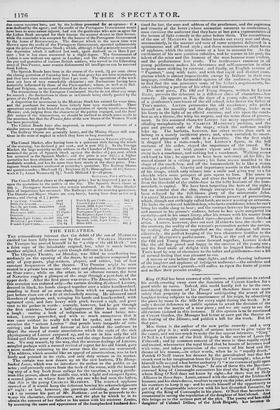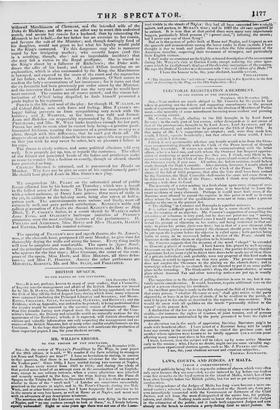King O'Neil has been crowned with success, and promises to
extend his mirth-creating sway over the dominion of Covent Garden for a good while to come. Indeed, this could hardly fail to be the case, considering the nature of his Power; and therefore there was more safety than propriety in the Manager anticipating the assent of his laughter-loving subjects to the continuance of his reign, by advertising the piece by name in the bills for every night during the week. It is only mm decent deference to public opinion to await the decision of the audience on the merits of a new piece ; and we are sorry to see the old custom violated in this instance. If this system is to be continued at Covent Garden, the Manager had better at once put the theatre on time footing of the Minors, and publish a bill for the week. But let that pass. Mrs. GORE is the author of the new petite comedy: and a very pleasant play it is ; with enough of serious interest to give value to the comic, amid not too much to make the fun appear intrusive. "King" O'Neil is a Captain of time Irish Brigade in the service of Louis the Fifteenth ; and by common consent of the mess is thus regally styled and treated, whensoever the royal blood that he boasts of becomes wad with wine, and takes possession of the crown of his head and the throne of his reason,—in other words, when lie is " royally drunk." Patrick O'Neill traces his descent by the genealogical tree that has struck root in his imagination from the Kings of Connaught ; who, as he himself tells us (and what better authority ?) " wore crowns of gold upon their heads long before the Deluge." In one of these fits, the Bacchus- crowned King of Connaught encounters his rival the King of France, whom King O'Neil does not know by sight—for there was no Hell, Alliance in those days. Louis, amused with the oddity of the Irishmen's humour, and his shrewdness, resolves to carry on the joke, and commands his courtiers to keep it up : and he avails himself of the opportunity to get rid of a disagreeable interview with his last discarded favourite, by putting the King of Connaught in his place. O'Neil thus becomes in- strumental in saving the reputation of the daughter of hisColcnel. And this brings us to the serious part of the plot. The young and beautiful daughter of Colonel Dillon, of the Irish Brigade, has becomes- th Widowed Marchioness of Clermont, anti the intended wife of the Duke de Richlieu: and she sees no other way to avert this undesired match, and secure her cousin for a husband, than by interesting the
Monarch in her behalf,—for her father has an aversion to her cousin, and favours the suit of the Minister ; and, though doatingly fond of his daughter, would not grant to her what his loyalty would yield to the King's command. To this dangerous step she is moreover urged by her intriguing mother ; who secretly hopes (and this is a revolting, though, alas I not an improbable incident) that she may fall a victim to the Royal profligate. She is traced to the King's closet by a follower of Richelieu's; the Duke with- draws the offer of his hand; and Colonel Dillon insisting on an explanation, which is also commanded by the King, the Marchioness is betrayed, and exposed to the scorn of the court and the reproaches of her father, who disowns her. At this juncture, O'Neil enters to
confirm the lady's asseverations of her innocence ; for it turns out that the ex.favourite had been previously put under arrest by the Minister,
and the interview that Louis avoided was the very one he would have most coveted. The cousins are of course united ; and the vinous hal- lucination of O'Neil' being dispelled, he finds himself promoted a grade higher in his regiment.
POWER is the life and soul of the play : for though H. WALLACE, as old Colonel Dillon, acts with force and feeling, Miss TAYLOR'S un- happy failing prevents us from sympathizing very much with the heroine ; and J. WEBSTER, as her lover, was cold and formal. Louis and Richelieu are respectably represented by G. BENNETT and rancumio ; and Airs. W. WEST looks heartless enough for her part. POWER has only to seem what lie cannot help being—a genuine good- humoured Irishman, wearing the manners of a gentleman as easy as a glove, though with this difference, that he can't putt them off. Ile staggers about and is beside himself in the most agreeable way possible ; so that you wish he may never be sober, he's so pleasant a fellow in his cups.
The drama is nicely written, and some political allusions told very well. It is properly got up, too, as regards the costumes. The effect of the fizzed and powdered heads of the ladies and gentlemen make us cease to wonder that a fashion so courtly, though so absurd, should have prevailed so long. Cnana.es Kesinoe is returned, and is announced for Handet on
?Monday. It does not he give its some of his capital comedy parts ? He should have played Louis in Mrs. GORE'S new play.



























 Previous page
Previous page